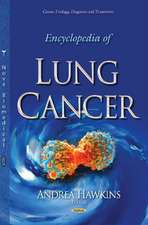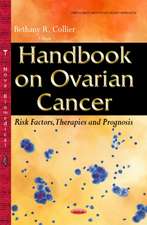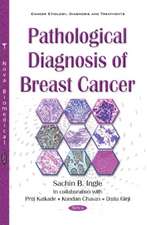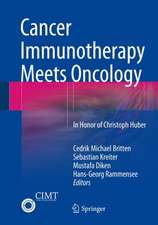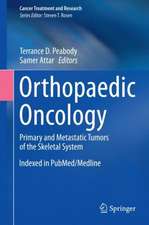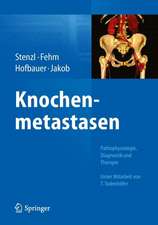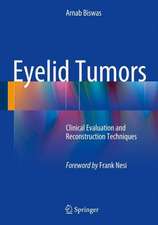Infectious Agents and Cancer
Autor Anton G. Kutikhin, Arseniy E. Yuzhalin, Elena B. Brusinaen Limba Engleză Hardback – 5 dec 2012
| Toate formatele și edițiile | Preț | Express |
|---|---|---|
| Paperback (1) | 706.60 lei 43-57 zile | |
| SPRINGER NETHERLANDS – 29 ian 2015 | 706.60 lei 43-57 zile | |
| Hardback (1) | 713.33 lei 43-57 zile | |
| SPRINGER NETHERLANDS – 5 dec 2012 | 713.33 lei 43-57 zile |
Preț: 713.33 lei
Preț vechi: 750.88 lei
-5% Nou
Puncte Express: 1070
Preț estimativ în valută:
136.49€ • 142.89$ • 112.94£
136.49€ • 142.89$ • 112.94£
Carte tipărită la comandă
Livrare economică 07-21 aprilie
Preluare comenzi: 021 569.72.76
Specificații
ISBN-13: 9789400759541
ISBN-10: 9400759541
Pagini: 128
Ilustrații: X, 118 p.
Dimensiuni: 155 x 235 x 17 mm
Greutate: 0.36 kg
Ediția:2013
Editura: SPRINGER NETHERLANDS
Colecția Springer
Locul publicării:Dordrecht, Netherlands
ISBN-10: 9400759541
Pagini: 128
Ilustrații: X, 118 p.
Dimensiuni: 155 x 235 x 17 mm
Greutate: 0.36 kg
Ediția:2013
Editura: SPRINGER NETHERLANDS
Colecția Springer
Locul publicării:Dordrecht, Netherlands
Public țintă
ResearchCuprins
Preface.- The Criteria of Inclusion of Infectious Agents in the List of Biological Carcinogens.- General Mechanisms of Biological Carcinogenesis.- The Role of Bacteria in Cancer Development.- The Role of Protozoa in Cancer Development.- The Role of Helminths and Fungi in Cancer Development.- Organ Microbiota in Cancer Development: the Holy Grail of Biological Carcinogenesis.- Conclusions: Are We There Yet?
Textul de pe ultima copertă
Over the years of cancer investigation a lot of discoveries in this field were made, and many associations between various biological carcinogens and cancer were revealed. Some of them are credibly determined, thus these infectious agents (human papilloma virus, hepatitis B virus, hepatitis C virus, Epstein-Barr virus, human herpes virus 8, human T-cell lymphotropic virus 1, human immunodeficiency virus, Merkel cell polyomavirus, Helicobacter pylori, Opisthorchis viverrini, Clonorchis sinensis, Schistosoma haematobium) are recognized as carcinogens and probable carcinogens by International Agency for Research on Cancer (IARC). The problem is of large importance, since share of infectious agents-related cancer cases is steadily increasing, reaching 25% according to certain estimates. It is worth noting that many of cancer cases are caused by infectious agents other than «conventional ones» like HPV, EBV, HBV, HCV, H.pylori etc. In recent years, a number of significant breakthroughs in the field were performed, such as the discovery of the microbiota role in cancer causation. Here in this book, almost all connections between «unconventional» carcinogenic infectious agents and cancer are described and analyzed comprehensively. The monograph was written with the idea that the language and concept will be rather simple and understandable for the wide audience, but the information contained in the book will be useful even for researchers working in the field of biological carcinogenesis who are familiar with the problem. Infectious Agents and Cancer may also be helpful for PhD, graduate and undergraduate students of biomedical faculties, and for their lecturers as well. The main idea of this book is to attract the attention to the problem of infectious agents causing human cancer other than the known biological carcinogens.
Caracteristici
A comprehensive analysis of the whole body of information about «unconventional» carcinogenic infectious agents Well-written text easily understandable for the wide audience but still useful even for the specialists who are familiar with the problem Helpful tables systematizing the key information on the field A list of all infectious agents suspected in cancer causation Principles of how to carry out a study devoted to biological carcinogenesis




